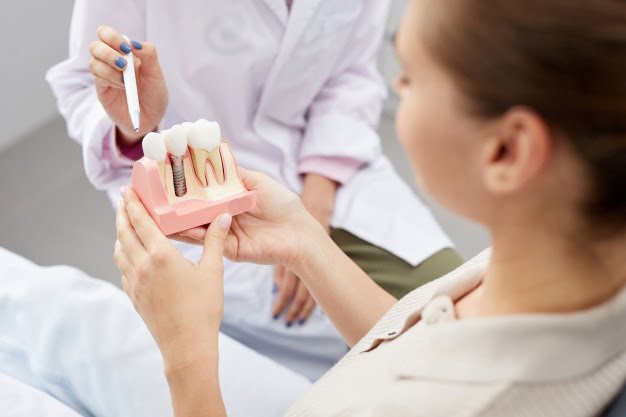Dental Implants Aftercare: Caring and Maintaining Your Dental Implants

Dental implants have quickly become the gold standard for tooth replacement. Dental implants are a great option for replacing lost teeth because they appear and feel natural, but they require careful maintenance to last a lifetime. In order to keep your dental implants healthy and functioning, you should know some things about aftercare, which will be covered in this post. Checkout dental implant care to learn more.
Key Takeaways:
- Dental implants have quickly become the gold standard for tooth replacement.
- There are several types of dental implants, including endosteal, subperiosteal, and mini implants.
- Dental implants provide several benefits over traditional tooth replacement options, such as preserving the jawbone and preventing wrinkles and sagging around the mouth.
- Proper care and maintenance are essential for the success and longevity of dental implants. This includes brushing, flossing, avoiding hard and sticky foods, and scheduling regular check-ups with your dentist.
- Healing and recovery time can vary depending on the type of implant and the individual’s overall health. It is important to follow post-operative instructions to ensure proper healing.
- Proper care and maintenance can prevent complications such as infection and implant failure.
- Dental implants can last a lifetime with proper care and regular dental checkups.
- If taken care of, dental implants can last a lifetime, but eventually you may need to get a new implant and restoration.
- Talk to your dentist about the choice and their recommendations for recovery.
What Are Dental Implants?
Dental implants are artificial tooth roots made of titanium that are surgically implanted into the jaw. Crowns, bridges, or dentures are placed above the implants to complete the procedure. Endosteal implants, subperiosteal implants, and micro implants are only a few of the varieties of dental implants available.
The majority of dental implants, known as endosteal implants, are inserted into the jawbone itself. Subperiosteal implants, which are implanted on top of the jawbone, are usually utilized for patients with insufficient jawbone density. Mini implants are utilized for smaller restorations, such as a single tooth replacement, because of their reduced diameter.
Oral surgeons are the usual medical practitioners entrusted with the task of implanting artificial tooth roots. An incision is made in the gums, and then a hole is drilled into the jawbone and the implant is placed there. After a few months have passed, the implant will have healed and integrated with the jawbone. An abutment is secured atop the implant after it has fused with the jawbone, and a restoration that mimics the patient’s natural teeth is then affixed.
Benefits of Dental Implants
Dental implants offer several benefits over traditional tooth replacement options such as bridges and dentures. They provide a permanent and stable replacement for missing teeth and look, feel, and function like natural teeth. Dental implants also help to preserve the jawbone and prevent it from shrinking, which can occur when a tooth is missing. This helps to maintain the natural shape of your face and prevent wrinkles and sagging around the mouth.
Caring for Your Dental Implants
Proper care and maintenance are essential for the success and longevity of dental implants. Here are some tips for caring for your dental implants:
Brushing and flossing tips: Brush and floss your dental implants as you would your natural teeth. Use a soft-bristled toothbrush and a non-abrasive toothpaste. Floss around the base of your dental implants to remove plaque and food particles.
Avoiding hard and sticky foods: Hard and sticky foods can damage your dental implants. Avoid chewing on hard objects such as ice, popcorn kernels, and hard candy. Also, avoid sticky foods such as caramel and taffy as they can pull the implant out of the jaw bone.
Scheduling regular check-ups with your dentist: Regular check-ups with your dentist are important for the health and longevity of your dental implants. Your dentist will examine your dental implants for any signs of wear and tear and will clean them to remove plaque and tartar.
Healing and Recovery
The healing time for dental implants can vary depending on the type of implant and the individual’s overall health. Typically, the healing time ranges from 3 to 6 months. During this time, it is important to follow the post-operative instructions provided by your dentist or oral surgeon.
Managing pain and discomfort: Pain and discomfort are to be expected after dental implant surgery. Your dentist or oral surgeon will provide pain medication to help manage discomfort. It is important to follow the instructions for taking the medication and not to exceed the recommended dosage.
Importance of following post-operative instructions: Following your post-operative instructions is crucial for the success and proper healing of your dental implants. This may include avoiding certain foods or activities, taking antibiotics as prescribed, and avoiding smoking and using straws.
Preventing Complications
Proper care and maintenance are essential for preventing complications with dental implants. Here are some tips for preventing complications:
- Identification and management of infection: Dental implant surgery carries a small risk of infection. Signs of infection include pain, swelling, redness, and discharge. If you suspect an infection, contact your dentist or oral surgeon immediately.
- Prevention of implant failure: Implant failure can occur if the implant is not properly cared for or if the patient experiences a significant change in their overall health. Proper oral hygiene, regular check-ups, and avoiding hard and sticky foods can help prevent implant failure.
- Importance of regular dental check-ups: Regular check-ups with your dentist are crucial for the health and longevity of your dental implants. Your dentist will be able to identify any potential issues and address them before they become a major problem.
Maintaining Your Dental Implants
Maintaining your dental implants once they have healed and fused with the jawbone is essential for keeping them in place for as long as possible. Tips for caring for dental implants are provided below.
To keep your dental implants in good shape, it’s important to get regular dental cleanings. Your dental practitioner will remove tartar and plaque from around your dental implants.
Maintaining a high standard of oral hygiene is essential to ensuring the longevity of your dental implants. Denture wearers should take the same care with their dental implants as they would with their natural teeth, including regular brushing and flossing.
Implants in the mouth, if cared for properly, can last for decades. Replacement alternatives are also available throughout time. But eventually, you could have to get a new implant and repair. The dentist is the ideal person to provide you advice on what to do.
Conclusion
Care for dental implants can improve your oral health and quality of life. They provide a permanent and stable replacement for missing teeth and look, feel, and function like natural teeth. However, proper aftercare is crucial for the success and longevity of dental implants. Dental implants can last for many years with proper care, regular check-ups, and good oral hygiene. If you’re considering dental implants, it is important to discuss the option with your dentist and to follow their post-operative instructions.
Frequently Asked Questions:
How do dental implants work?
Dental implants are artificial tooth roots made of titanium that are surgically implanted into the jaw. Crowns, bridges, or dentures are placed above the implants to complete the procedure.
What are the benefits of dental implants?
When compared to more conventional tooth replacement methods like bridges or dentures, dental implants have many advantages. They mimic the look, feel, and function of real teeth while also being a permanent solution to the problem of missing teeth. When a tooth is lost, the jawbone can deteriorate and collapse, but dental implants keep the bone healthy and intact.
How do I care for my dental implants?
Proper care and maintenance are essential for the success and longevity of dental implants. This includes brushing, flossing, avoiding hard and sticky foods, and scheduling regular check-ups with your dentist.
How long does it take for dental implants to heal?
The healing time for dental implants can vary depending on the type of implant and the individual’s overall health. Typically, the healing time ranges from 3 to 6 months.
Can dental implants fail?
Implant failure can occur if the implant is not properly cared for or if the patient experiences a significant change in their overall health. Proper oral hygiene, regular check-ups, and avoiding hard and sticky foods can help prevent implant failure.
How long do dental implants last?
Given the right treatment and upkeep, dental implants can last for decades. But eventually, you could have to get a new implant and repair.
How often do I need to see my dentist for dental implant check-ups?
Regular check-ups with your dentist are crucial for the health and longevity of your dental implants. Your dentist will be able to identify any potential issues and address them before they become major problems.






